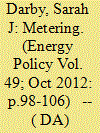|
|
|
Sort Order |
|
|
|
Items / Page
|
|
|
|
|
|
|
| Srl | Item |
| 1 |
ID:
177508


|
|
|
|
|
| Summary/Abstract |
Energy transitions change the relationships between technologies and human actors. Demand response (DR), the matching of demand to available electricity supply, is a relatively new activity, important for systems that rely on distributed renewable generation. Price-based DR is spreading among residential and small business customers, along with direct control of distributed and aggregated small loads, mostly thermal. In both types of DR, information and communication technology plays a part.
|
|
|
|
|
|
|
|
|
|
|
|
|
|
|
|
| 2 |
ID:
115636


|
|
|
|
|
| Publication |
2012.
|
| Summary/Abstract |
Fuel poverty is a function of household energy consumption, income, and the cost of delivered energy. The paper discusses ways in which current EU policy on the development of 'smart' metering could affect fuel poor households. The main focus is on developments in electricity metering and the development of 'active demand' and smart grids, so that demand can be matched closely with available supply. Advances in metering and related technologies open the way to time-of-use charging, easier switching between suppliers and between credit payment and prepayment, direct load control of some end-uses by the utility, greater scope for microgeneration, and improved consumption feedback for customers. These options open up both uncertainties and risks.
The paper offers definitions and discussion of various functions of smart metering, summarizes the EU policy background, and considers some possible equity implications of rolling out a new generation of meters. There follows an assessment of potential implications to the fuel poor of changes to metering, based on a review of the literature on energy feedback, tariffing, and supplier-customer relationships. Much of the discussion is based on the UK experience, with examples from other EU member states and, where appropriate, from other parts of the world.
|
|
|
|
|
|
|
|
|
|
|
|
|
|
|
|
| 3 |
ID:
115703


|
|
|
|
|
| Publication |
2012.
|
| Summary/Abstract |
Residential electrical demand response (DR) offers the prospect of reducing the environmental impact of electricity use, and also the supply costs. However, the relatively small loads and numerous actors imply a large effort: response ratio. Residential DR may be an essential part of future smart grids, but how viable is it in the short to medium term? This paper reviews some DR concepts, then evaluates the propositions that households in cool temperate climates will be in a position to contribute to grid flexibility within the next decade, and that that they will allow some automated load control. Examples of demand response from around the world are discussed in order to assess the main considerations for cool climates. Different tariff types and forms of control are assessed in terms of what is being asked of electricity users, with a focus on real-time pricing and direct load control in energy systems with increasingly distributed resources. The literature points to the significance of thermal loads, supply mix, demand-side infrastructure, market regulation, and the framing of risks and opportunities associated with DR. In concentrating on social aspects of residential demand response, the paper complements the body of work on technical and economic potential.
|
|
|
|
|
|
|
|
|
|
|
|
|
|
|
|
|
|
|
|
|